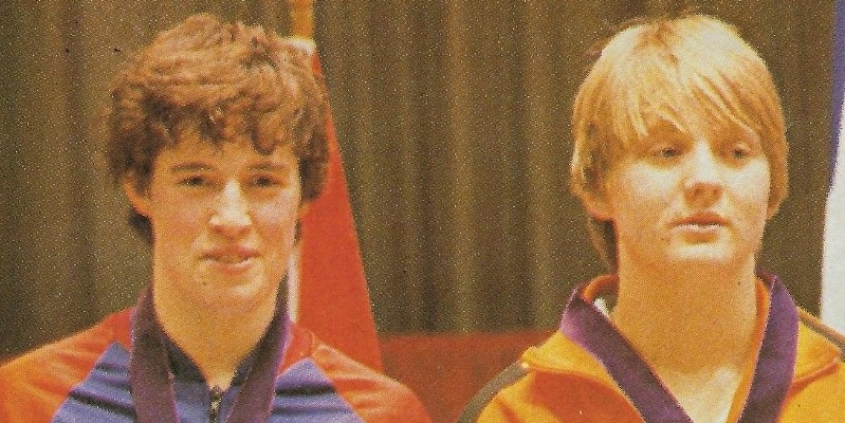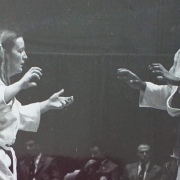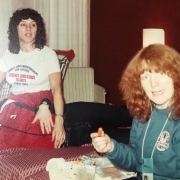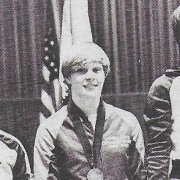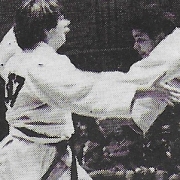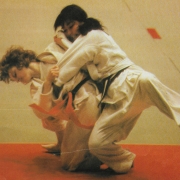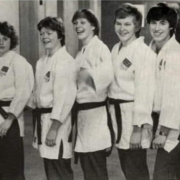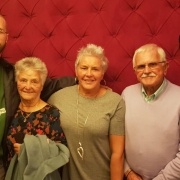First Women’s World Championships #3 – Catching Up with Avril Malley
At the tail end of 1980, in New York City, Madison Square Garden Indoor Arena, on November 29-30 a momentous event in the world of Judo took place: the first Women’s World Judo Championships.
There were seven fighters in the women’s Great Britain squad who competed in that inaugural event, and in the week leading up to the 40th Anniversary, British Judo will be posting an article written by Loretta Cusack-Doyle catching up with each member of the team, on the theme of “Where are they now?” interwoven with memories of the event from the ladies themselves from Loretta’s recent fun-filled chats with them.
Avril Malley -72kg – How did she do in competition?
On day one, Avril Malley the school Science Teacher from Northern Ireland was next to fight in her -72kg weight category. There were high hopes for Avril, one of the oldest and most experienced members of the GB Team, that she might be able to add another medal to the Silver gained by Dawn Netherwood earlier in the day.
Coach Roy Inman had huge confidence in Avril: she was one of the few in the team Roy kept at her usual weight category of –72kg: within domestic competition, she had won Gold at the British Open in the previous year at that weight, but she was also on form in having twice achieved international Silver medals earlier that year at the Dutch and German Opens. But Avril seemed to excel in international competition: in the previous three years she had achieved three Bronze medals in a row at the European Championships between 1978 and 1980, plus a Gold at the Dutch Open and another Silver at Germany: a total of 8 international medals when her GB successes were also added in. All of this, despite only being only 23 years old.
There was a feeling that Avril had done not too badly in the draw. She was to fight Andrée Barrette of Canada first, who was twice Canadian champion and had won a Pan American Open Gold and Silver but was felt to be beatable by Avril. However, her second bout was to be against Jocelyne Triadou who was the champion of the great judo nation of France, but more importantly at 26 years old had accumulated no less than 18 international medals to that date, including 10 Golds and 6 Silvers.

Photo: Avril Malley, Bronze winner at -72kg
Sure enough, Avril quickly dispensed with Barrette with an Ippon from a Kesa-getame having dominated the bout throughout. Unfortunately, the French champion Triadou demonstrated a wealth of techniques against which Avril fought gallantly in defence for the full four minutes to lose on a split referees decision (Hantei). So, Avril went into repechage, first against the former US champion Amy Kublin, who had also won the British Open in 1978. Another hard match that went the full course but decided on a unanimous Hantei in Avril’s favour. She then progressed on to the Bronze medal decider against Ines Kaspers of Spain whom she threw in the first 20 seconds for a Koka, and with determination against the three times Spanish national champion she maintained this lead to take Bronze and Great Britain’s second medal.
However, Avril wasn’t yet able to relax and enjoy the remainder of the event as a spectator and supporter. Roy had decided to enter Avril in the Open category which took place on the second day.
Avril had had an exhausting first day with three out of her four fights having gone the full time and again in three out of four the competition was unquestionably top class and Avril had competed well. Roy’s confidence in Avril and his knowledge of her skills influenced him in thinking she could come out next day with batteries recharged and fight in the Open against the best from each of the opposing nations. It was not to be. Avril’s first fight in the Open category was against Lorraine Methot of Canada, an in-form judoka who was Canadian national champion in the previous three years in a row, and twice Pan American champion over the same period. Avril was held for Ippon, which was perhaps an indicator of her previous day’s physical exhaustion. There was a chance that she might go into repechage but Lorraine Methot was then beaten by Barbara Fest of the United States, which served to end Avril’s participation. Was she disappointed … yes … but elated to have won Bronze the previous day.
What does Avril remember about the first women’s World Championships and its impact on her life and Woman’s judo?
It is typical of Avril that her recollections of the event centred around the immense team spirit and how much she enjoyed being part of that GB team and being able to express herself freely as a member of the team. She described the team as “The Golden Girls” who went out to “get medals” and the event title itself was less important, and individual performance did not rank as highly in her mind as that of a good spread of medals for everyone in the team.
Interestingly, Avril’s recognition of the desire of the team for everyone to get a medal, and the feeling amongst the girls that this was indeed possible was backed up some two months later by Judo Magazine’s write up of the event, where the magazine said,
“ … this is the only British Squad I have seen, either men or women, which was capable of taking a medal in every category and only cruel draws robbed Ann Hughes and Heather Ford of their chance. Dawn Netherwood, without doubt, would have beaten Simon but for her injury and everyone gave 100%. Their behaviour and infectiously cheerful attitude was a delight and their dress was a credit to the Association …”
Despite being one of the longest serving members of the team, at age 23, Avril had not always been able to publicise her involvement in the GB Team. This was November 1980, and Avril was a member of the team from Northern Ireland, just at the time when “The Troubles” were at their peak. It was not sensible or possible when Avril returned to her home for her to publicise her winning medals on behalf of Team GB, and she could not risk wearing the GB Team uniform bearing the Union Jack flag. When Avril travelled to foreign lands to take part in competitions, she was able to partly leave the troubles behind and join her other family of judo with whom she could relax and enjoy herself. She loved being part of the team and the fellowship of the “Golden Girls”.
Avril was part of the solution in Northern Ireland, not the problem. Her family were very sport-orientated and, on their initiative, Avril attended events promoted by her parents and family to bridge the divide between the conflicting communities and traditions in Northern Ireland. It was not just judo but riding, hockey, running, canoeing and more, but it was the judo and its competitive characteristics that drew Avril towards it as her favoured activity. The troubles had flared up in the 60’s and by the late 70s, weariness of the conflict had set in amongst the people and Avril’s family were motivated to work with others in a peace movement that arose that sparked initiatives to end the conflict and bring people together.
Avril and her equally judo-famous sister Joyce Malley, joined the Ren Bu Kan Judo Club, the first in the North, and run by Harry McQuigan who started judo late in life to offer an outlet for young people of all denominations in the community, and who himself went on to become the 2014 World Masters Champion. Initially, this was in the Centre of Dungannon, but Avril recalls it had to move after she returned home from competing in the Irish Open in 1974. They found that an explosion had rendered the dojo unusable, showering the club’s mat with glass and shrapnel and forcing Ren Bu Kan’s founding fathers to look elsewhere.

Photo: Avril Malley, with husband Anton and daughters Karyn age 30, Kira, 28 and Riona, 27
What is Avril Malley doing now?
Avril retired in stages from competitive judo shortly after the time that she won judo Commonwealth gold in Edinburgh and after competing in the Seoul Olympics: she kept her hand in and participated and won some of the bigger domestic events such as the British Open, which she last won in 1986, but won a Silver the following year in 1987 and then won a Gold again at the British Trials in 1988.
At the ripe old age of 63 years old, one would imagine that a lady like Avril might be taking a more sedate approach to life, but that is far from the case. Avril and the whole of her family had ridden horses all of their life – from age 3 in the case of Avril – and it is to horse-riding, and specifically the very demanding sport of Endurance Horse Riding that Avril returned some 15 years ago.
During her judo career Avril was a full-time Science Teacher at secondary schools, and this continued when she met and married her husband Anton and they moved to Qatar for 10 years connected with Anton’s work and Avril continued as a Science Teacher there. She has three daughters – Karyn age 30, Kira 28 and Riona 27.
Avril and her family now live and work full time in Normandy in France where they breed Arab horses specifically for Endurance Racing, and this extends to racing the horses and they make their income from selling them too. When I telephoned Avril, she had just returned from doing a training ride with one of her more powerful steeds. Being the brave lady she commented that it is really daunting sometimes doing what she does with the horses: she described it as “quite scary at times” – but it’s part of the job to ride them and keep them at peak performance, so “… I just climb on, close my eyes and get on with it…”
For her sport of Endurance Racing, Avril has bred her own and favourite mount, an Arabian Gelding called Moro Torcaz that she brought back from Qatar. Developing these horses is not an overnight job and Avril regards it as a special partnership. For example, she spent a year schooling Moro Torcaz and progressively increased the Endurance distances up to 40 and then 120-kilometre races, she told me. Back in her home country of Ireland there is not the structure to host many 160km (100 miles) races. The sport tends to stage events over shorter distances, but it is a growing sport around the world. As judo was in the 1980s, it is seeking to become an Olympic sport and there are plans to hold demonstration events at future Olympics in preparation for being adopted as a full Olympic event.
Avril is proud that she has returned to the international competitive scene, this time in the world of Endurance Horse Racing where she went to the World and European Championships with her horse, Moro. This makes it a total, between judo and endurance racing, of 6 World Championship staged events and 8 or 9 European: she can’t remember how many exactly, but she did say, “I’m pretty proud of that horse!!” What an amazing career and sportswoman.

Photo: Avril Malley riding an Endurance race on Arabian gelding Moro Torcaz
What did taking part in the first women’s World Championships do for Avril?
Avril believes that she was always a shy individual – indeed still is, she suggested – but being involved in women’s judo during her time unquestionably brought her out of her shell and gave her immense confidence to tackle anything that is flung at her. She regards herself as forward looking and despite having a fantastic career in judo and retaining an active interest in what is happening in the sport today, she is always looking ahead to find ways to develop her new sport.
She thanks Roy Inman for making her mentally strong. She hated EVERY squad training organised by Roy and the coaching team – it was brutal and hard and no prisoners taken. She recalls that often they would train to music, and she still gallops to the sounds of “Crazy Horses” by the Osmonds ringing in her head, just as the whole team did for the “Devil Training” organised by Roy.
She recalls that there were hardships as part of the team – even small things like the accommodation where, as a team, they did not have hotels but often had to sleep on the mats in cold community halls hired for centralised team training weekends. She remembers on one occasion waking up in the morning so cold that a glass of water she had left on the floor beside her had frozen solid. It was character building!
Avril is proud of the new business that she has built around endurance racing and it is not just about the income it creates but the enjoyment she gets from it and her lifestyle that she would not wish to change. The foundation upon which she has got to the happy place she is now was formed by those days as part of the GB team at the first women’s World Championships.

